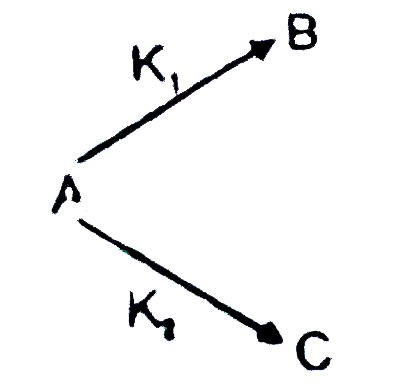All first order reactions are unimolecular.
T or F
The correct Answer is:F
To determine whether the statement "All first order reactions are unimolecular" is true or false, we can analyze the definitions of order and molecularity in the context of chemical kinetics.
1. Understand the Definitions:
- Order of Reaction: The order of a reaction is the sum of the powers of the concentration terms in the rate law. For a first-order reaction, the rate is directly proportional to the concentration of one reactant raised to the power of one.
- Molecularity of Reaction: Molecularity refers to the number of reactant molecules involved in an elementary reaction step. A unimolecular reaction involves one molecule, while a bimolecular reaction involves two.
2. Identify the Relationship:
- A first-order reaction implies that the rate depends on the concentration of one reactant. However, this does not necessarily mean that the reaction is unimolecular.
- A reaction can be first-order even if it involves two reactants, provided that one of the reactants is in excess. In such cases, the concentration of the excess reactant remains relatively constant, allowing the reaction to behave as if it were first-order with respect to the limiting reactant.
3. Example of a Bimolecular Reaction:
- Consider a reaction where A and B react to form C, and B is in excess:
A+B→C
- If B is in large excess, the rate can be expressed as:
Rate=k(A)(B)≈k′(A)
- Here, k′=k(B) is a new rate constant that incorporates the constant concentration of B. The reaction appears first-order with respect to A, even though the molecularity is bimolecular (2).
4. Conclusion:
- Since there are first-order reactions that can arise from bimolecular reactions where one reactant is in excess, the statement "All first order reactions are unimolecular" is False.
Final Answer:
False
- Order of Reaction: The order of a reaction is the sum of the powers of the concentration terms in the rate law. For a first-order reaction, the rate is directly proportional to the concentration of one reactant raised to the power of one.
- Molecularity of Reaction: Molecularity refers to the number of reactant molecules involved in an elementary reaction step. A unimolecular reaction involves one molecule, while a bimolecular reaction involves two.
- A first-order reaction implies that the rate depends on the concentration of one reactant. However, this does not necessarily mean that the reaction is unimolecular.
- A reaction can be first-order even if it involves two reactants, provided that one of the reactants is in excess. In such cases, the concentration of the excess reactant remains relatively constant, allowing the reaction to behave as if it were first-order with respect to the limiting reactant.
- Consider a reaction where A and B react to form C, and B is in excess:
A+B→C
- If B is in large excess, the rate can be expressed as:
Rate=k(A)(B)≈k′(A)
- Here, k′=k(B) is a new rate constant that incorporates the constant concentration of B. The reaction appears first-order with respect to A, even though the molecularity is bimolecular (2).
- Since there are first-order reactions that can arise from bimolecular reactions where one reactant is in excess, the statement "All first order reactions are unimolecular" is False.
False
Topper's Solved these Questions
- CHEMICAL KINETICSBOOK - CENGAGE CHEMISTRY ENGLISHCHAPTER - CHEMICAL KINETICSEXERCISE - Archives Multiple Correct
5 Videos
- CHEMICAL KINETICSBOOK - CENGAGE CHEMISTRY ENGLISHCHAPTER - CHEMICAL KINETICSEXERCISE - Archives Single Correct
19 Videos
- CHEMICAL KINETICSBOOK - CENGAGE CHEMISTRY ENGLISHCHAPTER - CHEMICAL KINETICSEXERCISE - Exercises Fill In The Blanks
37 Videos
- CARBOXYLIC ACIDS AND THEIR DERIVATIVESBOOK - CENGAGE CHEMISTRY ENGLISHCHAPTER - CARBOXYLIC ACIDS AND THEIR DERIVATIVESEXERCISE - Exercises Archives (Analytical And Descriptive)
34 Videos
- COORDINATION COMPOUNDSBOOK - CENGAGE CHEMISTRY ENGLISHCHAPTER - COORDINATION COMPOUNDSEXERCISE - Archives Subjective
18 Videos
Similar Questions
Knowledge Check
Which of the following esterification reactions are unimolecular?
A B
B C
C D
D
In any unimolecular reaction
Athe order and molecularity of the slowest step are equal to oneBmolecularity of the reaction can be zero, one or one stepCmore then one reacting species are involved in one stepDmolecularity of the reaction can be determined only experimentally.
A subtance undergoes first order decomposition involving two parallel first order reaction as :

The mole percent of B in the products is :
View SolutionA : The rate constant of first order reaction is used to calculate population if growth rate is given.
R : The rate constant is independent of concentration for first order reaction.
View SolutionA first order reaction has very high value of activation energy.
T or F
View SolutionAmongst the following chemical reactions, the unimolecular reaction is:
View SolutionIf the rate constant for a first order reaction is k, the time (t) required for the completion of 99% of the reaction is given by :
View SolutionIF the t1/2 for a first order reaction 0.4 min, the time of or 99.9% completion of the reaction is ............min.
View Solution
